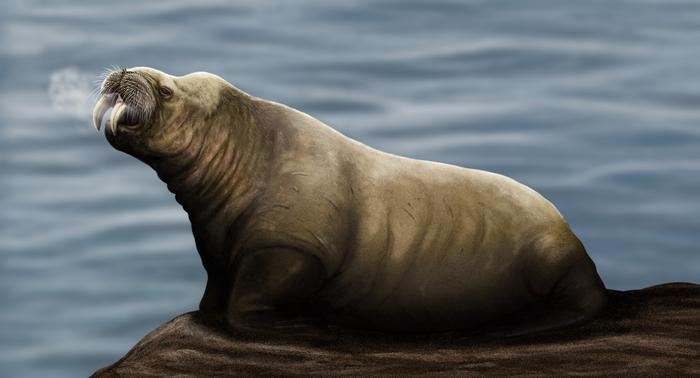Paleontologists have unearthed fossils of a previously unknown extinct marine mammal species, offering fresh perspectives on the evolutionary history of walruses and their relatives. The discovery highlights the dynamic nature of marine mammal adaptation over millions of years.
Ancient Suction-Feeder Emerges from the Depths of Time
The newly identified species, named Ontocetus posti, lived during the Lower Pleistocene epoch in the North Atlantic. Fossil remains were found in Norwich, United Kingdom, and Antwerp, Belgium. Initially mistaken for a known species, Ontocetus emmonsi, closer examination revealed distinctive features that set it apart.
Dr. Mathieu Boisville from the University of Tsukuba, Japan, who led the research team, explains the significance of the find: “The fossils of Ontocetus posti display a unique combination of features that distinguish it as a new species. These include the presence of four post-canine teeth, a larger lower canine, and a fused and short mandibular symphysis.”
These anatomical characteristics suggest that Ontocetus posti was well-adapted for suction-feeding, a trait it shares with modern walruses. This similarity is particularly intriguing as it represents a case of convergent evolution – where unrelated species develop similar traits in response to similar environmental pressures.
A Tale of Migration and Adaptation
The discovery of Ontocetus posti in the North Atlantic adds a new chapter to the evolutionary story of walrus-like mammals. The genus Ontocetus is believed to have originated in the North Pacific Ocean before spreading to the Atlantic during the Mio-Pliocene transition, roughly 5-7 million years ago.
This migration was likely facilitated by the Central American Seaway, an oceanic passage that existed before the formation of the Isthmus of Panama. The closure of this seaway and subsequent global cooling during the Late Pliocene had profound impacts on marine life, including the extinction of Ontocetus posti during the Early Pleistocene.
As Ontocetus posti vanished, it paved the way for the emergence and eventual dominance of the cold-adapted modern walrus, Odobenus rosmarus. This turnover in species highlights the crucial role of environmental changes in shaping the evolution and survival of marine mammals.
Why it matters: This discovery provides valuable insights into the evolutionary history of walruses and related species. It demonstrates how environmental changes over millions of years have driven adaptations in marine mammals, leading to the diversity we see today. Understanding these past processes can help scientists better predict how modern marine species might respond to current and future climate changes.
The convergent evolution observed between Ontocetus posti and modern walruses also underscores the importance of specific feeding adaptations in the success of these marine mammals. This knowledge could inform conservation efforts for existing species and provide context for understanding the potential impacts of changing ocean environments on marine mammal populations.
As research continues, scientists hope to uncover more details about the lifestyle and habitat preferences of Ontocetus posti. Future studies may focus on comparing the species with other extinct and extant walrus relatives to build a more comprehensive picture of pinniped evolution. Additionally, further exploration of Lower Pleistocene deposits in other regions may reveal more specimens of this species or potentially even more unknown relatives, expanding our understanding of marine mammal diversity through time.
If our reporting has informed or inspired you, please consider making a donation. Every contribution, no matter the size, empowers us to continue delivering accurate, engaging, and trustworthy science and medical news. Independent journalism requires time, effort, and resources—your support ensures we can keep uncovering the stories that matter most to you.
Join us in making knowledge accessible and impactful. Thank you for standing with us!

